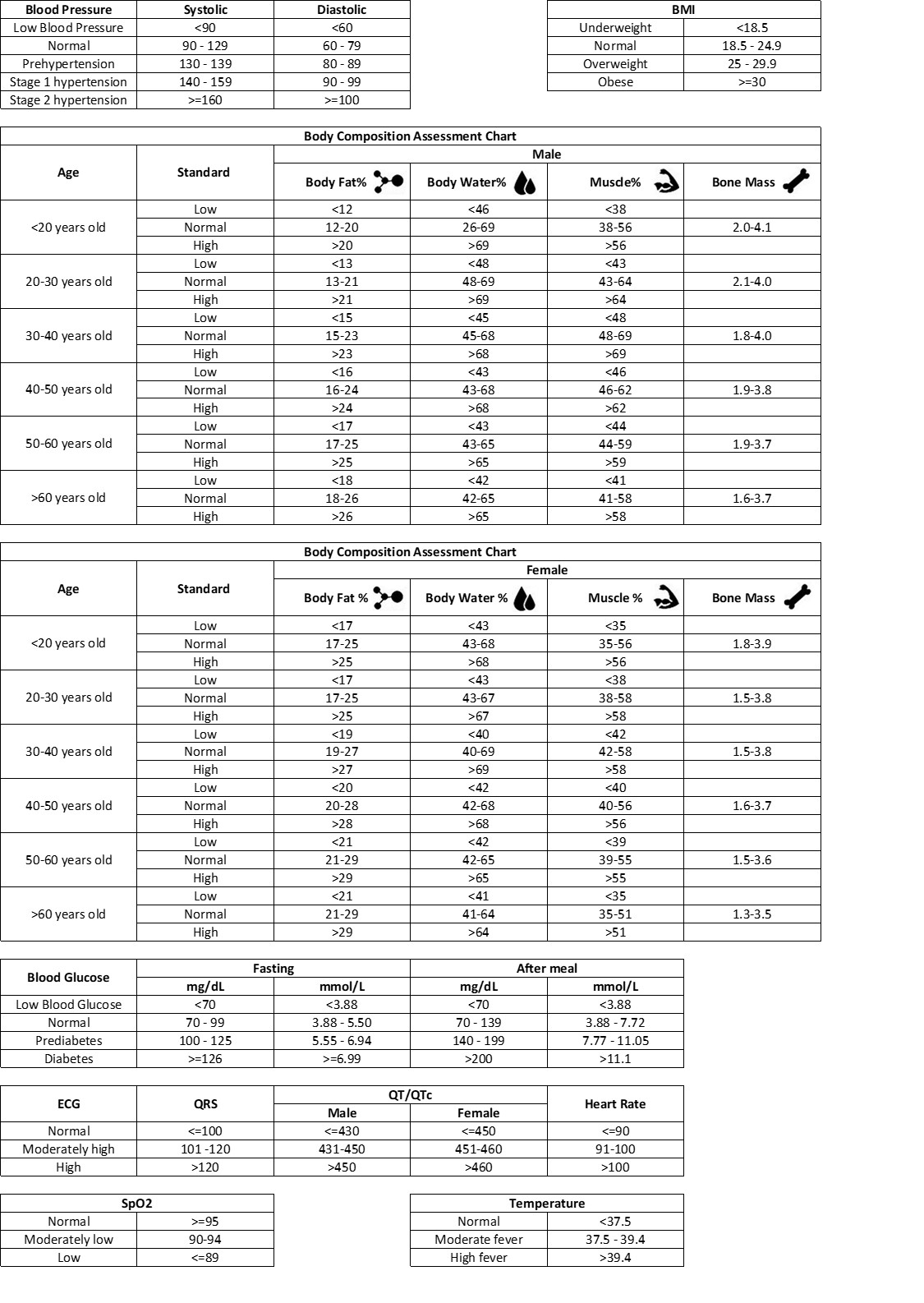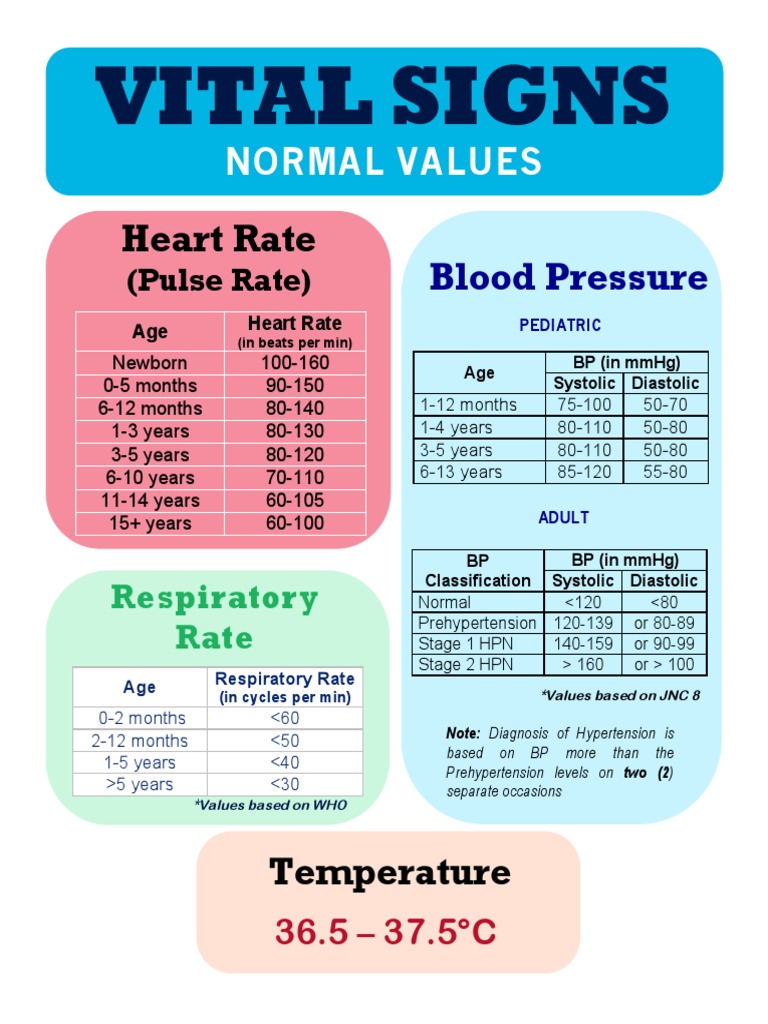Printable Normal Vital Signs Chart - 12 to 18 breaths per minute. Web the four main vital signs routinely monitored by medical professionals and health care providers include the following: 60 to 100 beats per minute. Eliminating hiv as a global public health threat tuesday, march 14, 2023. Web pulse + respirations adapted from nclexquiz.com vital signs cheat sheet temperature blood pressure normal health adult: These vital signs are the correct vital signs to use for the nremt exam. Normal values for each of these vital signs vary by age and, in some cases, by sex. 90/60 mm hg to 120/80 mm hg. Web pediatrician amy sniderman, md, explains what these measurements mean and outlines normal pediatric vital signs for children of all ages. Web the vital signs flow sheet can be used to track trends in a patient’s vital signs and to identify any potential problems.
Vital Signs Chart
120/80 mmhg oxygen saturation pulse + respirations pulse sites temporal carotid apical brachial radial femoral popliteal posterior tibial dorsalis pedis adapted from nclexquiz.com Web the four main vital signs routinely monitored by medical professionals and health care providers include the following: In most medical settings, the four standard primary vital signs are as follows: They include your body temperature, blood.
Printable Normal Vital Signs Chart Customize and Print
Normal ranges for these signs vary by age, bmi and other factors. Respiration rate (rate of breathing) blood pressure (blood pressure is not considered a vital sign, but is often measured along with the vital signs.) vital signs are useful in detecting or. How to take someone’s vital signs. While vital signs are the primary determinants to assess patient readiness.
Vital Signs
120/80 mmhg oxygen saturation pulse + respirations pulse sites temporal carotid apical brachial radial femoral popliteal posterior tibial dorsalis pedis adapted from nclexquiz.com Web pediatrician amy sniderman, md, explains what these measurements mean and outlines normal pediatric vital signs for children of all ages. Body temperature, heart rate, respiration rate, and blood pressure. Below is a list of normal vital.
1. Chart Pediatric Vital Signs Pediatric Vital Signs I Pediatrics
Types of digital thermometers for use by age 6 table 2: 120/80 mmhg oxygen saturation pulse + respirations pulse sites temporal carotid apical brachial radial femoral popliteal posterior tibial dorsalis pedis adapted from nclexquiz.com Contributed by amit sapra, md Web the four main vital signs routinely monitored by medical professionals and health care providers include the following: Web this vital.
Vital signs nursing, Vital signs chart, Normal vital signs
Normal respiratory rate (beats/minute) as per the pediatric advanced life support (pals) guidelines. Issues covered include health topics such as health equity, colorectal cancer, breast cancer screening, obesity, alcohol, tobacco use, hiv testing, motor vehicle safety, cardiovascular disease, and more. Web normal vital signs change with age, sex, weight, exercise capability, and overall health. Web vital signs measure the basic.
Image result for vital signs chart example Vital signs chart, Living
Below is a list of normal vital signs for each age range and gender. In most medical settings, the four standard primary vital signs are as follows: This document is intended to provide education and guidance on vital sign interpretation for adult populations but does not replace sound clinical judgment. Sit still in a chair with your feet flat on.
Pin on work
Preventing sickle cell anemia complications in children tuesday, september 20, 2022. Sit still in a chair with your feet flat on the floor with your back straight and supported. [ 1] heart rate (pulse) respiratory rate. Normal values for each of these vital signs vary by age and, in some cases, by sex. Web vital signs can vary between a.
Free Printable Vital Signs Forms Free Basic Monthly Vital Sign Log
12 to 18 breaths per minute. [ 1] heart rate (pulse) respiratory rate. They include your body temperature, blood pressure, pulse and respiratory (breathing) rate. Web all cdc vital signs. Contributed by amit sapra, md
Vital signs cheat sheet Pediatric nursing, Nursing school tips
Web the cdc vital signs health topic report includes an mmwr early release. They may also vary based on weight, exercise capability, and overall health. Web vital sign tables table 1: This document is intended to provide education and guidance on vital sign interpretation for adult populations but does not replace sound clinical judgment. Eliminating hiv as a global public.
vital signs chart Table of Normal Vital Signs Nursing (Vital Signs
Web pediatric vital signs reference chart. Web the cdc vital signs health topic report includes an mmwr early release. Web the four main vital signs routinely monitored by medical professionals and health care providers include the following: Normal heart rate (beats/minute) as per the pediatric advanced life support (pals) guidelines. 120/80 mmhg oxygen saturation pulse + respirations pulse sites temporal.
[ 1] heart rate (pulse) respiratory rate. 12 to 18 breaths per minute. Web vital signs by age: 120/80 mmhg oxygen saturation pulse + respirations pulse sites temporal carotid apical brachial radial femoral popliteal posterior tibial dorsalis pedis adapted from nclexquiz.com Normal pediatric vital signs chart Web vital signs measure the basic functions of your body. Web vital signs can vary between a patient’s age and gender, so it’s important to know the difference in values. Web pulse + respirations adapted from nclexquiz.com vital signs cheat sheet temperature blood pressure normal health adult: Preventing bloodstream infections in people on dialysis monday, february 6, 2023. This document is intended to provide education and guidance on vital sign interpretation for adult populations but does not replace sound clinical judgment. Body temperature, heart rate, respiration rate, and blood pressure. For a more detailed approach to this topic, see our podcast on “pediatric vital signs.” developed by dr. Web the cdc vital signs health topic report includes an mmwr early release. Web pediatrician amy sniderman, md, explains what these measurements mean and outlines normal pediatric vital signs for children of all ages. 60 to 100 beats per minute: Normal heart rate (beats/minute) as per the pediatric advanced life support (pals) guidelines. Sit still in a chair with your feet flat on the floor with your back straight and supported. 90/60 mm hg to 120/80 mm hg. Types of digital thermometers for use by age 6 table 2: Web this vital signs chart was compiled from the national emergency medical services educational standards (nemses), emergency medical technician instructional guidelines page 34.
Web Vital Signs Measure The Basic Functions Of Your Body.
Sit still in a chair with your feet flat on the floor with your back straight and supported. Preventing bloodstream infections in people on dialysis monday, february 6, 2023. Web normal vital signs change with age, sex, weight, exercise capability, and overall health. Inequities in flu vaccine uptake tuesday, october 18, 2022.
Respiration Rate (Rate Of Breathing) Blood Pressure (Blood Pressure Is Not Considered A Vital Sign, But Is Often Measured Along With The Vital Signs.) Vital Signs Are Useful In Detecting Or.
This document is intended to provide education and guidance on vital sign interpretation for adult populations but does not replace sound clinical judgment. Pediatric vital signs aren’t the same as adult vital signs. Body temperature, heart rate, respiration rate, and blood pressure. Web this vital signs chart was compiled from the national emergency medical services educational standards (nemses), emergency medical technician instructional guidelines page 34.
Web The Four Main Vital Signs Routinely Monitored By Medical Professionals And Health Care Providers Include The Following:
60 to 100 beats per minute: 12 to 18 breaths per minute. Types of digital thermometers for use by age 6 table 2: Contributed by amit sapra, md
Web Vital Signs Can Vary Between A Patient’s Age And Gender, So It’s Important To Know The Difference In Values.
Web pediatrician amy sniderman, md, explains what these measurements mean and outlines normal pediatric vital signs for children of all ages. 120/80 mmhg oxygen saturation pulse + respirations pulse sites temporal carotid apical brachial radial femoral popliteal posterior tibial dorsalis pedis adapted from nclexquiz.com Web all cdc vital signs. 90/60 mm hg to 120/80 mm hg.










